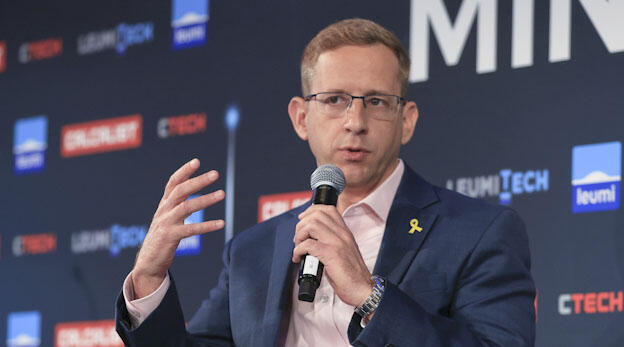
Mind the Tech NY 2024
NICE CEO: "We won't see an economic improvement until we see a change in leadership"
Barak Eilam, CEO of NICE, spoke at Calcalist and Bank Leumi’s Mind the Tech Conference in New York. "When the current generation in their 30s and 40s reach leadership positions in the government, things will change for the better"
NICE CEO Barak Eilam
(Elad Gershgoren, Tomerico)
"When the current generation of 30 and 40-year-olds reach a leadership position in the government, things in Israel will change for the better,” NICE CEO, Barak Eilam, said at Calcalist and Bank Leumi’s Mind the Tech conference in New York in a Fireside Chat with Calcalist reporter Sophie Shulman.
Regarding the consequences of the October 7th attack on the activity of NICE, Eilam said, “Since October I have been meeting with company executives from all over the world. This is the most terrible event that has happened to the Jewish people since the Holocaust. But if you look at the situation from a strategic point of view, I hear various diagnoses from NICE executives.
"The first is that Israel has always been strong as a country. It must be strong, and we need brains for that. The second thing they are worried about is that there are several things critical to the future of the country: the IDF, the tech industry which is the engine of economic growth, the unconditional support of the U.S., and the connection to the Jewish community around the world. These things must not be harmed.
"The third thing I hear is that Israel has a leadership problem. We will not see an improvement in the economic aspect until we see a change in terms of leadership. The last few months have shown us how great the current generation is. To reach the next level, a massive investment in infrastructure is needed and for that a change in leadership is needed. And here is an opportunity for a good change, a generational change in leadership. When this happens, when people in their 30s and 40s reach leadership positions in the government, things will change for the better."
Regarding NICE’s activities, Eilam said: "We operate in 150 different countries and have tens of thousands of customers. We received so much empathy and support from customers, there was no negative effect as a result of the war."
Eilam addressed the impact of artificial intelligence (AI), and in particular generative artificial intelligence, on the technology industry and the global economy. "Over the years there have been different waves of technology," he said. “From hardware, to software, to the Internet, to the cloud to AI. If you manage to ride these waves you will always win. But AI is different. It's a massive wave. It creates a new world, much bigger than the existing one. We are still in the early days, and now the value is in computational power. But the value creation will later move to the application level and usage scenarios. The last six months have been significant in terms of AI. We have proven time and time again that we can run a profitable company at scale, and that we have the ability to maintain profitability and change at the same time. The rate of innovation at NICE is at a speed that we have not experienced before. Most of our success in the last six months is a result of internal innovation."
In response to the question whether he believes that the current AI trend is a bubble or reflects a fundamental change, Eilam said: "When I think about macro trends, I try to look at it detached from the economic cycle of growth, bubble and crash. Two things will define the coming decades. The first is globalization. We are still dealing with the consequences of the pandemic, and the understanding of what globalization is doing to the supply chain. There are efforts all over the world to deal with this. Only 8% of the chips are made in the U.S., and most of them are on a small island called Taiwan. This will change dramatically in the next two decades. The second question is what will happen when AI meets white collar jobs. This will generate significant investments and changes."
Watch his full remarks in the video above.















